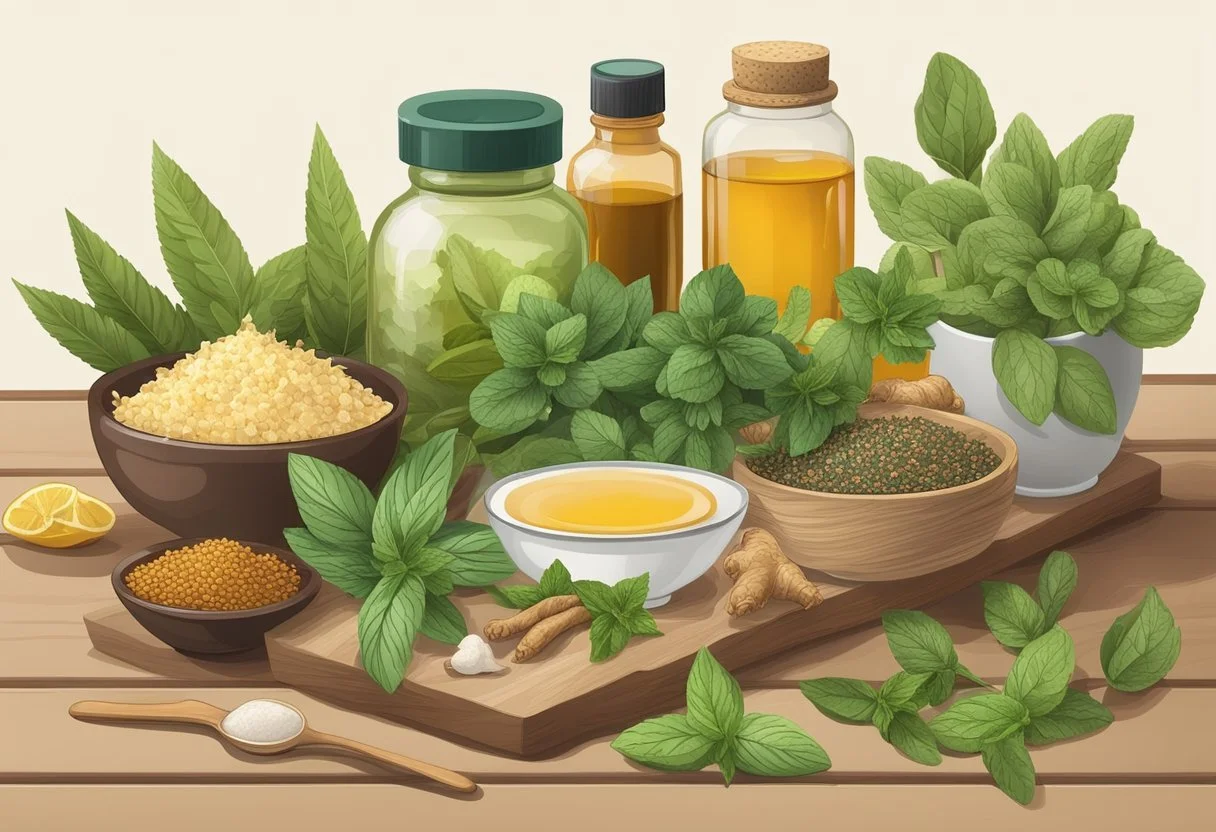5 Natural Cures for Bloating: Quick and Effective Remedies
Discover > Natural Health > 5 Natural Cures for Bloating: Quick and Effective Remedies
Bloating is a common issue that many people experience due to various factors, including digestive problems, food intolerances, and certain lifestyle habits. It occurs when the digestive tract fills up with gas or fluid, leading to a bloated stomach, abdominal discomfort, and sometimes pain. Irritable bowel syndrome, inflammatory bowel disease, and other gastrointestinal disorders can contribute to bloating as well. Though bloating is often uncomfortable, there are natural remedies that can help alleviate these symptoms and improve overall digestive health.
Diet plays a significant role in managing bloating issues. Consuming too much sodium, fatty foods, artificial sweeteners, and carbonated drinks can exacerbate digestive symptoms, whereas staying hydrated and choosing probiotics and anti-inflammatory foods can help restore balance in the gastrointestinal tract. In addition to diet, exercise is essential for maintaining regular bowel movements and reducing the risk of bloating. Monitoring your food intake and maintaining a food diary may help identify specific triggers and food sensitivities, allowing you to adjust your eating habits accordingly.
Simple, natural remedies like ginger and peppermint tea can help soothe abdominal pain and reduce the buildup of gas in the stomach. Drinking warm water throughout the day and incorporating healthy habits such as walking can help break up gas and relieve water retention. While these natural remedies can alleviate mild to moderate bloating, it's vital to consult with a healthcare professional if symptoms persist or worsen, as chronic bloating may signify an underlying medical condition that requires further investigation and treatment.
Understanding Bloating
Causes of Bloating
Bloating is a common issue that many people face. It refers to the feeling of fullness or discomfort felt in the abdominal area, often accompanied by visible swelling of the stomach. Bloating is usually caused by a buildup of gas within the gastrointestinal (GI) tract, often resulting from digestion and bacteria breaking down food.
Some common causes of bloating include:
Constipation: Slow movement of food waste through the digestive tract can lead to bloating and discomfort.
Irritable Bowel Syndrome (IBS) and Inflammatory Bowel Disease (IBD): These gastrointestinal disorders can cause chronic bloating and other digestive symptoms.
Food intolerance: Difficulty digesting certain types of food, such as lactose or gluten, can cause bloating and gas.
Carbonated drinks and swallowing air: Sipping carbonated drinks or swallowing too much air when eating can cause a buildup of gas in the stomach.
Table of common causes of bloating:
Constipation:
Description: Slow movement of food waste through the digestive tract.
IBS and IBD:
Description: Gastrointestinal disorders causing chronic bloating and other digestive symptoms.
Food Intolerance:
Description: Difficulty digesting certain types of food like lactose or gluten.
Carbonated Drinks and Swallowing Air:
Description: Accumulation of gas in the stomach from consuming carbonates or swallowing air.
Role of Diet and Digestive Health
A diet rich in processed foods, sodium, and artificial sweeteners can worsen bloating. On the other hand, consuming foods high in fiber can help prevent constipation and maintain a healthy digestive system. For those with IBS or IBD, adapting to a low-FODMAP diet (fermentable oligosaccharides, disaccharides, monosaccharides, and polyols) can help alleviate bloating symptoms.
Food sensitivities, such as lactose intolerance or celiac disease, can also play a significant part in bloating. It is essential to identify specific food triggers to reduce bloating and prevent further digestive issues. Maintaining a food diary, alongside seeking medical advice and potential testing, can be useful in identifying and managing food intolerances.
In addition to dietary adjustments, staying hydrated by consuming plenty of water, reducing carbonated drinks, and incorporating gentle exercise can help with digestion and reduce bloating. Certain natural remedies, such as ginger or peppermint tea, can aid in alleviating bloating and promoting digestive health.
In summary, understanding the common causes of bloating and the role of diet and digestive health is key in finding natural cures for bloating and promoting overall gastrointestinal health.
Natural Remedies to Alleviate Bloating
Embrace the Power of Digestive Bitters
Digestive bitters have been used for centuries to help alleviate bloating and other digestive issues. Bitters stimulate the production of digestive enzymes and juices, which can help the body break down and digest food more effectively. This can ultimately reduce the buildup of gas in the gastrointestinal tract and lessen abdominal discomfort. Incorporate bitters into your diet, especially if you're experiencing symptoms of food intolerance or sensitivity.
Put Down the Liquid While You Eat
Drinking liquids while you eat can dilute your digestive juices, slowing down the digestive process and potentially leading to a bloated stomach. Drinking carbonated beverages can also increase gas and water retention. Try to limit your intake of liquids while eating, and avoid carbonated drinks altogether when possible.
Ensure Optimal Stomach Acid
Optimal stomach acid is crucial for the proper breakdown and digestion of food, which can help minimize bloating. An imbalance in the digestive tract, such as low stomach acid, can lead to food sensitivity and symptoms of irritable bowel syndrome (IBS). Consider adding a probiotic supplement to your diet to restore balance to your digestive system, reducing the risk of bloating and other digestive symptoms.
Listen to Your Body's Hunger Cues
Overeating can worsen bloating and other digestive issues. Be mindful of your body's hunger cues and try to avoid eating beyond the point of fullness. Eating smaller, more frequent meals can also benefit your digestive system. Keeping a food diary can help you identify triggers and recognize any food allergies or sensitivities that might contribute to abdominal bloating.
Unleash the Potential of Raw Ginger
Ginger has long been recognized for its potential to alleviate abdominal pain and digestive symptoms, including bloating. Incorporate raw ginger into your diet or try ginger tea to experience its benefits. Ginger can help promote healthy bowel movements, alleviate inflammation in the gastrointestinal tract, and can counteract the negative effects of certain foods that might cause bloating.
Remember, while these natural remedies may help alleviate bloating, it's crucial to seek medical advice if you continue to experience chronic bloating or severe abdominal discomfort, as this could be a sign of a more serious underlying condition.
Medical Interventions and When to See a Doctor
Bloating can be a result of various factors such as digestive issues, food intolerance, and water retention. Although there are many natural remedies to alleviate bloating, sometimes medical interventions may be necessary, particularly when bloating is caused by underlying health issues.
Medications and Supplements: There are several over-the-counter medications available to help with bloating, such as antacids, simethicone-based products, and probiotic supplements. They can target various factors causing bloating, such as excess gas, digestive tract imbalance, or bad bacteria overgrowth. It is potential that doctors may also prescribe medications aligned with specific medical conditions causing bloating.
Underlying Health Conditions: Bloating may be a sign of more severe conditions such as endometriosis, cancer, gastroparesis, colitis, or irritable bowel syndrome (IBS). It is essential to monitor symptoms like persistent abdominal pain, severe abdominal discomfort, and chronic bloating. In such cases, a medical consultation is necessary for proper evaluation and treatment.
When to See a Doctor: It is crucial to consult a healthcare professional when bloating symptoms worsen, persist, or recur consistently. Situations indicating a need to see a doctor include:
Severe or prolonged abdominal pain
Rapid weight loss without any lifestyle changes
Blood in the stool
Vomiting or fever alongside bloating
In conclusion, medical interventions play a vital role in addressing bloating when natural remedies don't provide relief or underlying health conditions require further evaluation. Monitoring symptoms closely and seeking professional advice in severe cases is crucial to maintain optimal gut health.
Alternative Therapies and Ongoing Research
Emerging Natural Treatments
In recent years, various natural remedies are being studied for their potential to alleviate bloating and promote gut health. Some of these emerging treatments include bromelain, an enzyme found in pineapple, which may aid in the digestion of proteins and help reduce bloating. Additionally, ginger tea and peppermint tea are gaining attention for their potential to soothe the gastrointestinal tract and relieve symptoms of bloating.
Furthermore, probiotic supplements containing beneficial bacteria are being researched for their potential in supporting digestive health and preventing bacterial overgrowth, which can lead to bloating. Fermented foods (What wine goes well with fermented foods?) such as kefir, sauerkraut (how long does sauerkraut last?), and kombucha are also thought to have a positive impact on gut health, thanks to their naturally occurring probiotics that may help balance intestinal flora.
The Impact of Diet Trends
Diet trends, such as the low-FODMAP diet and the increased consumption of whole grains and fermented foods, are being studied for their potential in alleviating bloating and promoting digestive health. The low-FODMAP diet involves restricting certain carbohydrates, like fermentable oligosaccharides, which can contribute to bloating and other digestive issues.
Some popular low-FODMAP foods include:
By limiting the consumption of high-FODMAP foods and focusing on more easily digestible alternatives, people suffering from gastrointestinal disorders such as irritable bowel syndrome (IBS) may experience relief from abdominal bloating and discomfort.
Furthermore, incorporating whole grains and fermented foods into one's diet may play a positive role in digestive health. Foods such as:
Quinoa
can provide essential nutrients and fiber, promoting healthy bowel movements and reducing the risk of bloating. On the other hand, fermented foods like kefir, sauerkraut, and kombucha can promote the growth of good bacteria in the gut, improving overall gut health and potentially reducing bloating symptoms.
Maintaining a food diary can help individuals track their diet and identify any foods that may cause bloating, enabling them to make informed dietary decisions and minimize the risk of experiencing digestive issues. It is essential to remember that everybody is different, and finding the optimal diet for digestive health and bloating reduction may require some trial and error.
Conclusion and Summary
In conclusion, bloating is a common symptom experienced by many people due to various causes, such as food intolerance, irritable bowel syndrome, or water retention. The good news is that several natural remedies and lifestyle changes can benefit our digestive health and alleviate bloating.
Keep a food diary: Keeping track of your food intake can help identify food sensitivities, allergies, or intolerances that may be causing bloating.
Stay hydrated: Drinking plenty of water throughout the day aids digestion, helps maintain regular bowel movements, and reduces fluid retention.
Incorporate probiotics: Probiotic supplements or foods that contain beneficial bacteria help maintain balance within your digestive tract, reducing the risk of bacterial overgrowth and subsequent bloating.
Exercise regularly: Physical activity can improve bowel movements and reduce symptoms of bloating by releasing excess gas and stool.
Limit gas-producing foods: Carbonated drinks, artificial sweeteners, and fermentable oligosaccharides-rich foods can contribute to bloating. Monitor and adjust your intake accordingly.
Natural remedies like ginger tea, peppermint tea, and warm water can also help to alleviate abdominal discomfort and bloating. However, some underlying medical conditions, such as inflammatory bowel disease or gastrointestinal disorders, may require professional treatment.
By implementing the above tips and incorporating natural remedies when suitable, individuals can work towards minimizing bloating and optimizing their overall digestive well-being. In case bloating persists, worsens, or is accompanied by severe abdominal pain, it is important to consult a healthcare professional for an adequate diagnosis and treatment plan.






